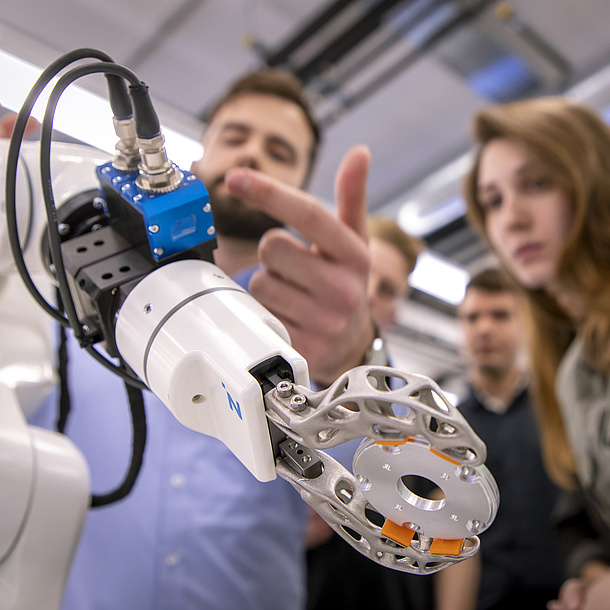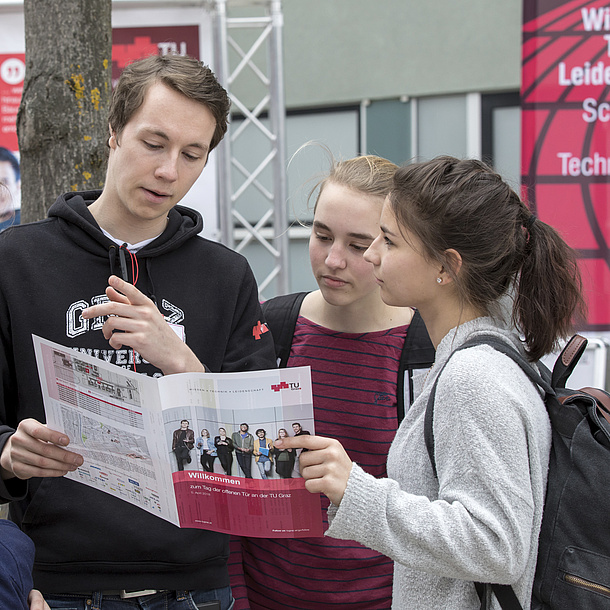- Duration of study: 6 semesters
- ECTS credit points: 180
- Academic degree: Bachelor of Science (BSc)
- Language of instruction: German
The Bachelor's Programme
The unique feature of this interdisciplinary study programme that combines aspects of both technology and economics is clear: You will learn how to develop holistic solutions to solve complex societal problems and ensure their sustainability. The knowledge you acquire about innovative technologies, construction, materials and manufacturing processes, as well as their effects on the economy, will help you to do so.
This degree programme emphasises technical and analytical strengths, as well as independence, personal responsibility and social competence. In terms of technical skills, you will receive a solid education in the basic principles, concepts and methods of mechanical engineering. The economic education provides you with insights into basic principles and interrelationships of construction management. You will be able to apply this theoretical knowledge – for example, in a special field of mechanical engineering – and learn which methods are needed for these applications.
You will be given exclusive glimpses into practical application during excursions to companies in the mechanical engineering sector and have the opportunity to hear national and international guest speakers who work in the field of mechanical engineering.
Play video
Studying Mechanical Engineering and Business Economics
This techno-economic degree programme offers a sound basic and methodological education with the following focal points:
Mathematics: You can understand and apply the basic principles of engineering mathematics. You will learn how to apply differential equations in mechanical engineering as well as acquire basic knowledge about probability theory and application-oriented, computer-aided statistics.
Technical mechanics: You learn to understand, analyse and calculate interactions among forces and movements.
Fundamentals of natural sciences: You familiarise yourself with quantities and units used in physics and technology, electricity, magnetism, vibrations, optics, forces and point mechanics, as well as work and energy.
Fundamentals of design and technology: You receive a specialised introduction to mechanical engineering and mechanical technologies, and learn to operate and use lathes, drilling and milling machines in a training workshop.
Design theory: You learn more about topics such as machine drawing, engineering geometry, CAD and machine elements.
Engineering informatics: You learn how to solve engineering problems using IT-based methods.
Theoretical science of machines: You are presented with an overview the field of thermodynamics (i.e. basic information and technical applications) and extensive fundamental knowledge about fluid mechanics and heat transfer, machine dynamics and electrical engineering.
Economic sciences: You acquire detailed knowledge in the specialist areas of business administration, management accounting, the fundamentals of industrial management as well as corporate management and organisation.
What will I have to do in the first semesters? How much practice can I expect? And what can I actually do with my degree when I've finished? Check what you expect!
A student and a lecturer will take time for all your questions and you will get to know TU Graz during on-site appointments. Up to 10 persons can participate at each date.
Contact: lse@tugraz.at
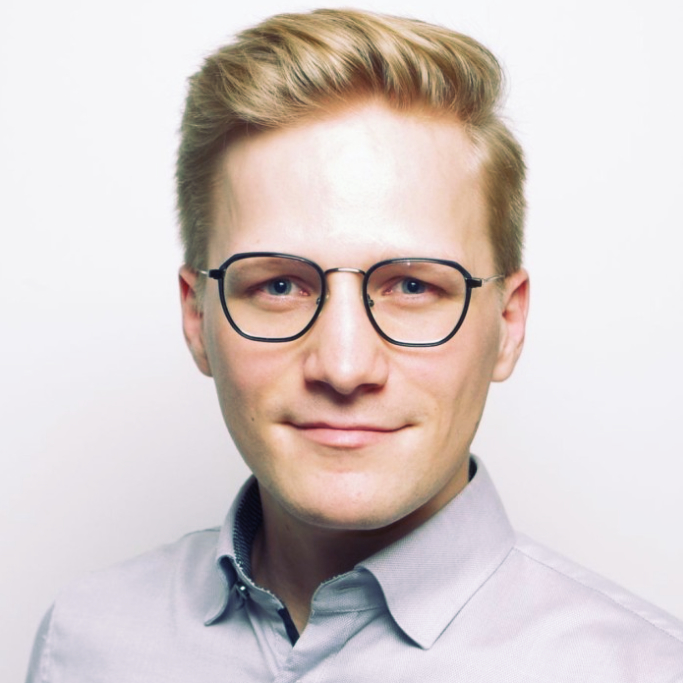
I recommend this degree programme to anyone who wants to understand the mechanical foundations of engineering as well as speak the "language of business". During my studies, I found an association via WINGnet Graz which allowed me to connect with a broad network of dedicated students and exciting business partners. It wasn’t only possible to exchange contacts here, I could also make friendships.
The field of mechanical engineering at TU Graz is directed toward research and industry. Networks formed with leading industrial partners (e.g. Andritz, AVL, Magna, Siemens, voestalpine) enables TU Graz to offer the highest quality of education and makes it easier for graduates to enter their careers.
At the same time, interdisciplinary research is carried out at TU Graz in so-called Fields of Expertise. In the field of mechanical engineering, mobility, production and renewable energy are highlighted. Research is conducted in the field of electric mobility (e.g. human/machine interface and operating concepts, electric vehicle motion dynamics), on innovative production processes (additive manufacturing) and on engines (e.g. the development of virtual engines, use of alternative energies), as well as on other topics.
The TU Graz research findings provide groundbreaking answers to current challenges being faced in the overland transportation and aviation, space travel and production engineering and management.
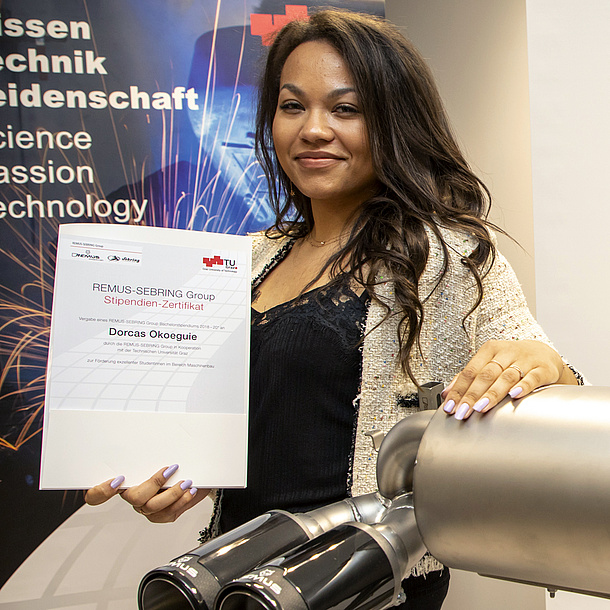
When I chose my degree programme, it was really important to me to find something that I would both enjoy and that would be of great importance for social progress. Nevertheless, as a graduate of a commercial academy, I initially felt as if I could only choose from among a limited number of degree programmes. But after attending the FIT Info Day and learning more about how many different technical degree programmes were available, I decided to study Mechanical Engineering and Business Economics so that I could add new technical knowledge to my previously acquired economic knowledge.
Admission
Requirements for admission to a bachelor's degree programme at TU Graz
Summer semester 2026
Admission period: 7 January to 5 February 2026
Winter semester 2026/27
Admission period: 6 July to 5 September 2026
If you are required to take the supplementary examination "Descriptive Geometry" when you are admitted to the Civil Engineering and Construction Management programme, you can take it during the bachelor's programme.
Contact study@tugraz.at
Perspectives for Graduates
Graduates of the Bachelor’s Degree Programme in Mechanical Engineering and Business Economics have fundamental knowledge in the natural and engineering sciences as well as practical knowledge in civil engineering.
After completing your studies, you can work in a wide variety of areas, for example
- in research and development departments,
- in production planning and control,
- in technical sales and technology marketing,
- in purchasing or supply chain management,
- in consulting at various levels, even providing management assistance in technology companies.
In addition, you will be qualified to apply for advanced engineering master's degree programmes in all areas of mechanical engineering and construction management.
Civil engineers have very good opportunities for advancement. Studies show that their career paths usually lead over time to management positions.
After completing the bachelor's degree programme, you can enrol in the following master’s degree programmes without further requirements:
- Mechanical Engineering
- Mechanical Engineering and Business Economics
- Advanced Materials Science
- Production Science and Management
- Green Process Engineering
Information on other master's degree programmes with requirements you can find on the respective pages for the master’s degree programmes.
In addition, the bachelor's degree offers you the opportunity to apply internationally for master's degree programmes.
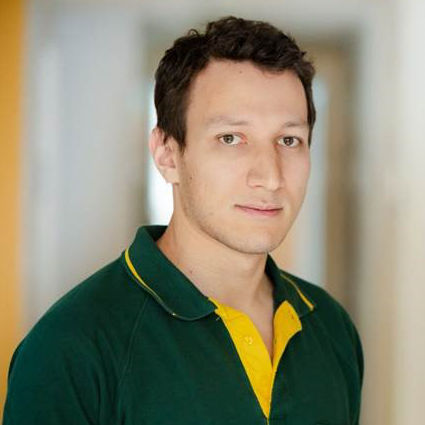
I think that the most valuable thing about taking part in the degree programme at TU Graz was learning how to analyse complex issues and systems and to understand their behaviour. This skill is crucial for me to work successfully as the person responsible for digitalization at the KWB GmbH. I’m totally convinced that the Mechanical Engineering and Business Economics degree programme at TU Graz can be the ideal starting point for a successful career in almost any field.

Mechanical Engineering and Business Economics is a broad yet demanding degree programme. What particularly excites me is the connection between technology and business. It is the perfect combination to prepare me for my future career.
- WINGnet Graz (WirtschaftsINGenieurstudentennetzwerk)
- WING - Die Wirtschaftsingenieure
- ESTIEM (European Students of Industrial Engineering and Management)
- EPIEM (European Professors of Industrial Engineering and Management)
- Techno-Ökonomie Forum of TU Austria
